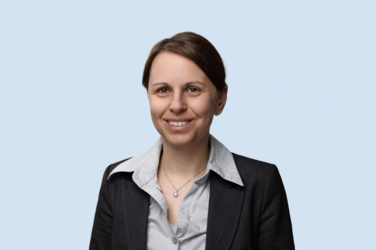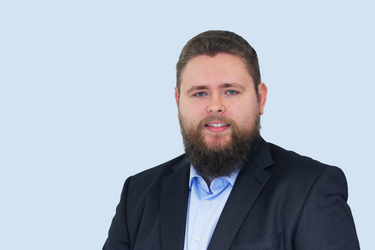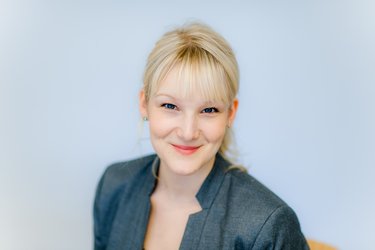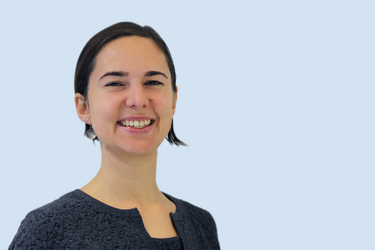Research Associates
Dr. Anely Bekbergenova

Anely Bekbergenova joined the Chair of Research and Science Management in 2024 as a Postdoctoral research fellow.
Anely’s research focuses on leadership, gender, entrepreneurship, and human-computer interaction. She is particularly interested in how exposure to role models, or the embodiment of role models in virtual reality can influence individual performance.
In September 2023, she defended her doctoral dissertation at the faculty of business and economics at the University of Lausanne (HEC Lausanne). Her doctoral research focused on charismatic signaling and gender in entrepreneurial and academic settings. She explored whether women and men were perceived differently when employing identical verbal and nonverbal communication tactics. Also, whether women and men used these tactics differently. Further, she investigated whether real and virtual human leaders are perceived differently and how individuals react differently to erring algorithms in comparison to erring humans. She has applied methods, such as virtual reality, deep fake, computerized detection of nonverbal behavior, and automated detection of verbal charisma.
She earned her Bachelor of Science in Management degree and Master of Science in Finance degree at HEC Lausanne in Switzerland. Prior to starting her doctoral studies, she worked in the wealth management sector in Switzerland.
See here for more information.
Dr. Jakub Cichor
Jakub Cichor is a postdoctoral research associate at the Chair of Research and Science Management, Head of Focus Area "Educational Technologies in Leadership and Expert Development" at the TUM Center for Educational Technologies (TUM EdTech Center), and a member of the TUM Neurophysiological Leadership Lab (TUM NeLeLab). He completed his B.Sc. and M.Sc. in Informatics: Games Engineering at the Technical University of Munich with an emphasis on serious games, gamification, and game-based learning. He was awarded his PhD for his dissertation titled "Leadership in the Digital Age: Utilizing Social Robots and Virtual Reality in Leadership" by the TUM School of Management.
His research focuses on educational technologies at the intersection between human-computer interaction and organizational behavior, specifically on investigating social robots and AI in leadership positions and implementing Virtual Reality applications for leadership development. He also explores the use of technology in skill development, for instance in public speaking training or leader-follower interactions in a mental health context.
See here for more information.
Dr. Leidy Cubillos-Pinilla

Leidy Cubillos-Pinilla has been an integral member of our team since 2018. She is currently serving as a lead research associate and PostDoc at the TUM Neurophysiological Leadership Lab (TUM NeLeLab). Her current research encompasses various domains, including: (a) Investigating the influence of leadership language on followers' cognitive and emotional processes through online studies employing vignettes, audios, computerized tasks and questionnaires; (b) Exploring the neuroscience of entrepreneurship by examining psychophysical, electrophysiological, and eye-tracking correlates during rest and computerized tasks among individuals interested in entrepreneurship; (c) Studying the psychophysical, electrophysiological, and eye-tracking markers of cognitive effort during decision-making tasks; (d) rule-breaking moderating the influence of morality on entrepreneurial intention; (e) exploring topics associated to Artificial Intelligence, social neuroscience, emotion, cognition, creativity, and big data statistics; (f) Examining the interplay between hormones and leadership.
Leidy holds a diploma in Psychology with a Minor in Biology from the University of Los Andes, Colombia. Following her undergraduate studies, she gained valuable experience at Mercados Zapatoca S.A, a leading supermarket chain in Colombia, where she served as the Head of Recruitment and Development HR. She furthered her academic journey by completing a master's degree in Neuro-Cognitive Psychology at Ludwig-Maximilians Universität, München, and has contributed to several neuroscience laboratories. She successfully defended her PhD thesis within our department, further solidifying her dedication to advancing knowledge in her field.
See here for more information.
Dr. Regina Hagl (née Dutz)
Regina Hagl joined the team in 2017, as a research associate and PhD candidate. She is doing research in the field of recruitment and personnel selection, with a special focus on academic STEM disciplines (science, technology, engineering, and mathematics). Furthermore, she is interested in perceptions and evaluations of leader behavior, especially with regard to destructive leadership styles. See our FührMINT project for more information.
Regina Hagl studied Management and Technology (B.Sc. and consecutive M.Sc.) at the Technical University of Munich, focusing on Marketing, Strategy & Leadership and Electrical Engineering & Information Technology.
See here for more information.
Dr. Martin Fladerer
Dr. Martin Fladerer joined the Chair of Research and Science Management in April 2020 as a post-doctoral research fellow.
Together with Prof. Dr. Claudia Peus and Dr. Armin Pircher Verdorfer (University of Amsterdam) he works in the DFG-funded research project “Does the place make the people? The role of leadership and work climate for moral and prosocial socialization in the workplace“. Previously Martin worked at the Center for Leadership and People Management at LMU Munich. He was awarded his PhD by the LMU Munich for his thesis on identity in leadership processes. He studied psychology at the University of Bielefeld (BSc) and LMU Munich (MSc).
Martin’s research focuses on leadership processes. In particular, he is interested in personal and social identities of leaders and followers. He is also interested in the ethical dimension of leadership.
See here for more information.
Dr. Ilse Hagerer

Dr. Ilse Hagerer joined the Chair of Research and Science Management in October 2022 as a postdoctoral researcher. Her research focuses on higher education management, diversity, leadership, and the influence of digitalization on organizations. Previously, she was part of the BMBF-funded research projects PlayMINT and MINT@Work at the Technical University of Munich (TUM) and did research on diversity management and women in leadership positions, particularly in STEM.
In February 2021 she defended her PhD at Osnabrück University, which focused on higher education management, especially effective organizational structures of faculties. She received a master’s and bachelor’s degree in economics and business administration at Fernuniversität Hagen. Additionally, she holds a degree from Ludwig-Maximilians-University of Munich (LMU) in German Philology, Philosophy, and Sociology (M.A.).
See here for more information.
Arij Briki, M.Sc.

Arij Briki joined the Chair of Research and Science Management in September 2023. She works as a research associate in the TUM Neurophysiological Leadership Lab (TUM NeLeLab). She completed her Bachelor’s degree in medical engineering at the Eberhard Karls University of Tübingen followed by a Master’s degree in the elite Neuroengineering program at the Technical University of Munich.
Her current research focuses on exploring leadership behavior and leadership perception in virtual reality environments using physiological measures. Her aim is to contribute to the field of organizational neuroscience by providing an empirical definition for existing leadership theoretical and qualitative frameworks.
See here for more information.
Mira Kaut, M.Sc.

Mira Kaut joined the Chair of Research and Science Management in April 2022 and is working as a research associate in the Research Group Teamwork | Leadership | Digital Age (Dr. Eleni Georganta). After completing her bachelor’s degree in Psychology with Cognitive Science at the University of Sussex, United Kingdom, she received her master’s degree in Neuro-Cognitive Psychology at Ludwig-Maximilians Universität, Munich. Her research focuses on expectations towards AI teammates. In her work, she aims to explore how the human perception of an AI teammate differs from that of a human teammate and how these differences might lead to certain expectations which influence collaboration. Her goal is to investigate these expectations and how they can be shaped to improve team processes with experimental and neuroscientific methods.
See here for more information.
Hannah Kunde, M.Sc.
Hannah Kunde joined the Chair of Research and Science Management in December 2018. She works as a research associate and PhD candidate in the TUM Neurophysiological Leadership Lab (TUM NeLeLab, Dr. Franziska Emmerling). There she explores leadership from a (neuro)cognitive perspective to unravel the basic psychophysiological processes underlying effective and ineffective leadership behaviour.
Hannah Kunde received her Bachelor’s degree in Psychology of Teaching, Learning, and Training (B.A.) at the University of Erfurt. Afterwards she studied an international, interdisciplinary and research-oriented master’s program in Psychology at Ludwig Maximilian University of Munich (M.Sc. in Psychology: Learning Sciences).
See here for more information.
Theresa Weitz, M.Sc.

Theresa Weitz is a doctoral researcher at the School of Management of the Technical University Munich (TUM). She joined the Chair of Research and Science Management in June 2022 as a research assistant and became a doctoral candidate in August 2023 holding a scholarship from Konrad-Adenauer-Stiftung. After completing her bachelor’s degree in “Economics” at Ludwig-Maximilians-University (LMU) Munich, Theresa Weitz received her master’s degree in “Consumer Science” focusing on Marketing, Strategy & Leadership at TUM. During her studies, she received the “Deutschlandstipendium”. She previously gained practical experience as an intern at BMW and PwC and as a working student at Infineon Technologies and Gibson Dunn.
In her research, Theresa Weitz focuses on the influence of information, emotions, and values on decisions and how companies and leaders can engage in strategic employee development and how this affects employees' loyalty to the company. Her dissertation project explores when and why employees opt for non-hierarchical career steps combining qualitative and quantitative methods. She thereby aims at contributing to the societal awareness for alternative career steps and their advantages for organizations and individuals.
See here for more information.
Clarissa Zwarg, M.Sc.

Clarissa Zwarg joined the Chair of Research and Science Management in July 2020 as a research associate and PhD candidate. In collaboration with Prof. Dr. Claudia Peus, Dr. Armin Pircher Verdorfer, and Dr. Martin Fladerer, she works on the DFG-project “Does the place make the people? The role of leadership and work climate for moral and prosocial socialization in the workplace”. Since 2023, she has been working with Prof. Dr. Mats Alvesson as part of the TUM-IAS Hans Fischer Senior Fellowship.
Clarissa Zwarg studied Psychology at the Ludwig-Maximilians-University in Munich (B.Sc.), where she also earned her M.Sc. in Economic, Organizational, and Social Psychology.
See here for more information.



